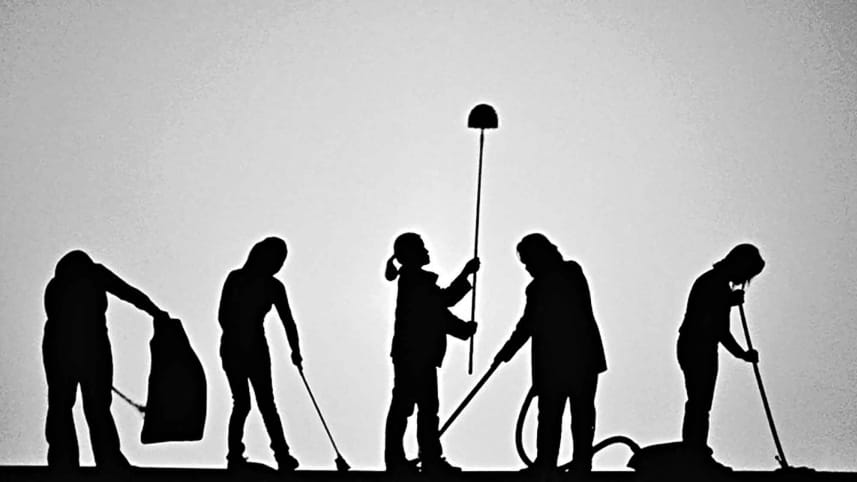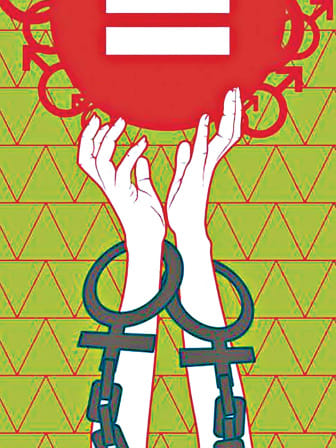Creating a safer Bangladesh for women

Despite enacting several laws in the past decades to protect women and girls from violence, creating a safer space for women and girls is still a distant reality for Bangladesh. A safe space is that which allows every citizen to live, work, commute and access without any fear of being violated. Sadly, for most of the women and girls in Bangladesh, irrespective of urban or rural settings, life both within and outside the home is an everyday challenge. Domestic violence, child marriage, dowry demands, sexual violence and harassment, economic abuse, etc. are all common phenomenon for women living in Bangladesh. We have had a good number of evidence also pointing towards the weak prevention and protection mechanisms that are in place to combat issues of violence against women. We have spoken and heard about those challenges and barriers several times in the past and yet the issues persisted and sometimes had even grown to larger scales, putting women in increased vulnerability in their private and public lives.
The issues of discrimination, social degradation and exclusion, lack of empathy, inadequate protection services, lack of access to justice and weak prosecution for offenders, are challenges so deeply rooted in our socio-legal tenets that there is certainly no single short-term solution to address the crisis. But that does not also imply that we are left with no hope to begin the healing process in order to ensure a safer Bangladesh for women.
I believe the critical first step is to collectively accept and acknowledge that violence and discrimination against women are real—that they are not some feminist propaganda—that when a woman says she has been victimised it is not because she had asked for it or because she has some ulterior motive against some innocent men. I find this crucial because there is a typical silence and ignorance to some extent surrounding the issues of violence and harassment that women of all ages and backgrounds experience in their lives in our country. From the exterior, there may seem a lot of noises around these issues but when it comes to real actions, issues of violence and harassment against women perhaps rank at the bottom of the list of priority. The blame for this attitude of discounting the harsh reality, which half of the country's population faces, can be attributed to all of us—both collectively and individually. It only takes brutality of some extreme level that we pay some attention to a particular victim of violence, while still being oblivious of the fact that violence and harassment is a reality for majority of the women—women who are working, commuting or taking care of the household chores.
No doubt, violence against men also exists and so does violence against gender diverse communities. However, it is beyond any question that in the end, it is the women who are the majority of the victims of varied forms of violence in Bangladesh—the same being true for the rest of the world. As such, when voices are raised to prioritise issues of violence against women, disregarding those voices on the pretext that existing laws are already biased towards women (as opposed to men) is clearly mistaken and damaging. Victim blaming, together with endorsing the perception that generalises all complaints of violence against women as being false and fabricated, further fuel the vulnerability of women seeking justice against rights violations. These deep-rooted misogynist ideas and perceptions are then inevitably penetrated through the hierarchies of state mechanisms and are often reflected in the policy actions and judicial approaches. This is precisely the reason that we need to break through the silence around issues of violence and harassment against women and challenge the prejudicial perceptions and patriarchal norms that condone a culture of violence.
Efforts of transforming patriarchal social norms should run parallel to those that aim to strengthen the law and policies addressing violence against women. A legal framework can be said to be robust in protecting women from violence when the laws are free from misogynist phrases that create stereotypes and are not discriminatory against women. Examples of such stereotypes and discriminatory provisions are plenty. To name few obvious ones—our evidence law since 1872 considers a woman victim of rape as less credible when she is proved to be of "immoral character"; and a 13-year-old child can be legally raped by her husband without incurring any criminal responsibility.
Together with reforming the regressive and discriminatory legal provisions, creating a safer Bangladesh would require equal attention to be paid on the implementation mechanisms of the laws. Again, successful enforcement of the laws would involve sufficient budget allocation and equipping the enforcing agencies with adequate resources and capacities to implement the law. At the same time, a well-planned monitoring and evaluation process of the laws need to be installed to check on how the intended users are using a particular law and what barriers do they face in accessing the remedies provided. Monitoring is also crucial to ensure accountability of the enforcing agencies without which even a progressive law would inevitably remain only on paper. An apt example is the Domestic Violence (Prevention and Protection) Act of 2010, which had introduced several innovative civil remedies for victims of domestic violence; yet, as recent studies had revealed, its implementation is almost nil in many of the districts. One of the key reasons for the law's ineffectiveness appeared to be the lack of knowledge and awareness about the law among victims of domestic violence. Also, the number of shelter homes for victims of violence is extremely inadequate at present. Lack of provisions for shelter homes and livelihood opportunities for victims of violence means they have no other alternative than to resort back to the abusive relationship.
Apart from protective laws, creating a safe space for women essentially requires changes in infrastructures that address the fear of violence and harassment among women in accessing the public spaces. Ensuring safety protocols for women in public transports, installing sufficient streetlights, providing gender segregated public toilets, creating safe and accessible public recreation spaces are all matters that are essentially connected to creating safe space for women. In Bangladesh, absence of such services and accesses largely restricts mobility of women and hence avenues of opportunities for them become even narrower.

Although forms of severe physical violence including rape, sexual assault, acid violence, etc. are commonly understood as crimes, most acts of sexual harassment are still considered normal in public eyes. Verbal abuse, indecent language or gesture, inappropriate touch, groping etc. are behaviours that most women in Bangladesh experience in their lifetimes. Accepting certain acts of sexual harassment as normal behaviours, or trivialising the act by calling it as mere "eve teasing" is an offshoot of the age long patriarchal attitude that views women as inferior to men who can be sexually objectified and exploited. The very words "eve teasing" had long been replaced by our Supreme Court with the term "sexual harassment", yet we see rampant use of the terminology even in official communications.
More so, the normalisation of sexual harassment and the silence around it are so deeply entrenched that nowhere in the laws do we find any reference of the term "sexual harassment". Offences which are in the nature of sexual harassment are not defined as such and are rather characterised by vague legal provisions with outdated and gender insensitive wordings such as "insulting modesty of a woman". The only place where we could find reference to the terms "sexual harassment" is the 2009 guideline issued by the High Court Division in response to a writ petition. The guideline itself emphasised in several places in the judgment that until a new law is enacted addressing sexual harassment, the guideline should be considered as a binding law. However, lack of enforcement and monitoring mechanism led to lax implementation of this guideline—with few exceptions, the guideline remained largely unenforced. Moreover, despite increasing number of daily incidents of sexual harassment, and absolute lack of protection for women and girls studying or working outside home—we still could not enact a law that addresses prevention and protection from sexual harassment, as envisaged in the 2009 guideline by the High Court Division.
Sexual harassment and discrimination at workplaces are common struggles for most of the working women. On one hand, providing additional grievance mechanism against sexual harassment is more often considered unnecessary on part of the employers in formal workforces. On the other hand, for workers' trade unions and associations, other more impending demands like minimum wage, safety and welfare benefits usually overshadow the issue of sexual harassment at workplaces. Added to this, the factory inspectors are not equipped with resources or capacities to identify and prevent sexual harassment in workplaces. Neither the Labour Act of 2006 mentions "sexual harassment" anywhere in the text. Moreover, majority of the women workforces in Bangladesh are in the informal sector where a minimum regulatory framework is absent, let alone a mechanism to prevent and address sexual harassment. Incidents of sexual abuse of domestic workers commonly appear on the headlines. Other than an ornamental policy on domestic workers, there is practically no law that protects them from exploitation and discrimination at work.
This lack of empathy towards sexually harassing behaviours that women at workplaces often have to put up with, discourages them from availing challenges and opportunities and thus helps maintain the superior position of men at work. There is thus a strong need to not only ensure prevention and protection mechanisms against sexual violence within workplaces, but also to create awareness and knowledge around what behaviours should be considered offensive and sexually harassing against women.

In order to ensure a safe space for women in Bangladesh, another essential aspect is to collect periodic data on all forms of violence against women and girls and ensuring public access to the information. Also, we need to be mindful that women's safety must be addressed with an intersectional approach. Women who are further marginalised by age, ethnicity, disability, sexual or gender diversity are often at higher risk of violence and as such efforts against violence must have due regards to the intersectional identities.
It is also crucial that we identify the champions for women's rights from grassroots to national levels and create meaningful partnerships and synergies to inform and guide the efforts of creating safe space for women in Bangladesh. Achieving an enabling environment that promotes women's safety would also undoubtedly necessitate a stronger collaboration that includes public agencies as well as civil society members and development partners, working towards a common goal of providing a safe country to our women and girls. Media can also be an important crucial player in ensuring women's rights. There are good many examples where efficient media reporting had led cases of violence in the right track and had facilitated the process of getting justice by the victims at the end. However, it is this crucial power of media that essentially requires that, reporting on violence against women is to be done more responsibly and with higher degree of sensitivity.
As we are slowly stepping into the post-pandemic world, challenges in ensuring safety of women in the country would be inevitably all the more difficult. With the obvious risk of increase in the number of child marriages and in the incidents of gender-based violence, Bangladesh needs to be prepared with newer and stronger strategies to fight against inequality and discrimination. More than anything, a transformation of the social tenet is essential which not only accepts the reality of violence against women, but also actively promotes an equal and safe space for all.
Taslima Yasmin teaches at the Department of Law, University of Dhaka.
Email: taslima47@yahoo.com




 For all latest news, follow The Daily Star's Google News channel.
For all latest news, follow The Daily Star's Google News channel.
Comments